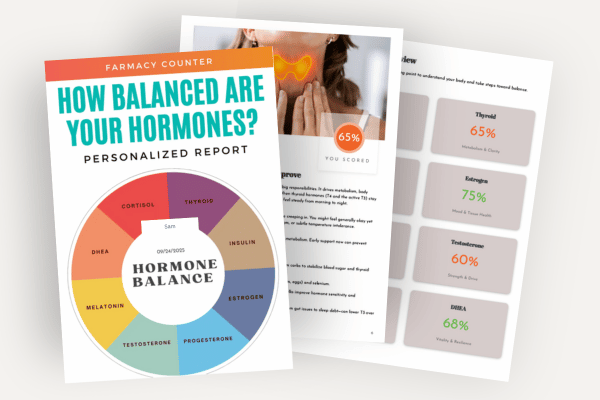
At some point, many women start to sense something has shifted. The rhythms that once felt predictable—energy, sleep, mood, appetite, focus—start to change. And when we begin to ask deeper questions about what’s happening inside our bodies, the thread often leads back to one root system: our hormones.
In functional medicine, we understand that hormones don’t act in isolation. They’re part of a dynamic web influenced by stress, blood sugar, gut health, detoxification, sleep, nutrient status, and even past trauma. These chemical messengers regulate how we think, feel, move, connect, and metabolize life—both physically and emotionally.
Here are six key hormones I believe every woman should understand—not just to “fix” symptoms, but to reconnect with her body in a wiser, more informed way.
1. Estrogen: The Architect of Vitality
Estrogen is often viewed solely through the lens of cycles and fertility—but it does so much more. It supports bone density, cardiovascular health, neurotransmitter balance (like serotonin), and cognitive clarity. When estrogen is balanced, many women feel lit up—creative, connected, and confident.
But when estrogen is too high or too low—often due to poor liver clearance, stress, gut dysbiosis, or environmental xenoestrogens—it can lead to:
- Heavy or irregular periods
- Mood swings or irritability
- Weight gain around hips/thighs
- Breast tenderness or fibroids
Supporting estrogen isn’t about suppressing it—it’s about helping the body metabolize and clear it effectively, especially through the gut-liver axis.

2. Progesterone: The Calming Counterbalance
Often called nature’s Xanax, progesterone is the hormone that counterbalances estrogen and brings a sense of calm, safety, and steadiness to the second half of the cycle.
Produced mainly after ovulation, progesterone supports:
- Deep, restorative sleep
- Mood regulation and resilience
- Fertility and uterine health
- Stress buffering through GABA support
But chronic stress, under-eating, and perimenopausal transitions can lead to low progesterone, leaving you feeling:
- Anxious, restless, or weepy
- Wired but tired at night
- Short-tempered or emotionally reactive
Functional medicine looks at why progesterone is dropping—not just when—and helps restore it by reducing stress load, optimizing ovulation, and supporting adrenal function.

3. Cortisol: The Survival Signal
Cortisol is your main stress hormone, produced by your adrenal glands in response to anything your body perceives as a threat—be it a looming deadline or unresolved trauma.
When balanced, cortisol helps you wake up energized, regulate inflammation, and respond to life’s demands. But when it’s chronically elevated—or later depleted—you may experience:
- Fatigue that doesn’t lift with rest
- Belly weight gain or bloating
- Anxiety, brain fog, or light sleep
- Hormonal dysregulation across the board
Cortisol interacts directly with your thyroid, insulin, estrogen, and progesterone, which is why adrenal dysfunction is often at the root of hormonal chaos. In functional medicine, we support the HPA axis (hypothalamic-pituitary-adrenal) with sleep, nutrient therapy, circadian rhythm work, and nervous system repair.

4. Insulin: The Blood Sugar Whisperer
Insulin’s job is to shuttle glucose from your bloodstream into your cells for energy. But due to processed foods, erratic meals, stress, and inflammation, many women develop insulin resistance, where the cells stop listening to insulin’s signal.
This can result in:
- Cravings (especially for sugar or carbs)
- Fatigue after meals
- Weight gain around the midsection
- Irregular cycles or PCOS-type symptoms
Insulin is closely tied to ovarian function, estrogen balance, and cortisol rhythms. Stabilizing blood sugar—through balanced meals, strength training, and circadian rhythm alignment—is often one of the first things I address in practice.

5. Thyroid Hormones: The Metabolic Metronome
The thyroid gland produces hormones (primarily T4 and T3) that regulate your metabolic rate, temperature, brain function, and energy production.
When thyroid hormones are even slightly low (often missed with conventional lab testing), women may experience:
- Sluggishness, depression, or brain fog
- Cold intolerance
- Hair thinning or dry skin
- Constipation and slow digestion
- Menstrual irregularities
In functional medicine, we assess not just TSH, but also free T3, free T4, reverse T3, and thyroid antibodies to rule out autoimmune triggers like Hashimoto’s and address nutrient co-factors (like selenium, iodine, and iron) needed for optimal thyroid function.

6. Oxytocin: The Hormone of Connection and Repair
Oxytocin is released when we feel safe, seen, and connected. It rises during moments of trust, laughter, intimacy, or simply being held—and is a potent antidote to chronic stress.
Low oxytocin can manifest as:
- Emotional disconnection
- Feeling isolated or touch-averse
- Slower healing
- Heightened sensitivity to stress
Oxytocin supports immune health, vagus nerve tone, and cortisol regulation, and it’s a key part of the healing journey—especially for women coming out of long-term survival mode.
In my work, restoring oxytocin looks like helping women feel safe in their bodies again, often through somatic practices, therapeutic relationships, and reclaiming joy—not just “fixing” labs.

Your Hormones Are Communicating—Are You Listening?
Hormones aren’t here to sabotage you. They’re feedback loops—responding to your environment, your nourishment, your thoughts, and your past. They reflect what your body has been adapting to, often in silence.
The first step isn’t to chase balance—it’s to understand your patterns, build awareness, and begin gently restoring the systems that support hormone health: digestion, detox, blood sugar, nervous system, and rest.
Want to know which hormones might be out of balance in your body?
👉 Take the “How Balanced Are Your Hormones?” Quiz »
Get a free, personalized 13-page hormone report covering 8 key hormone systems, including:
✅ Your unique hormone balance snapshot
✅ Insights for energy, mood, sleep, metabolism, and reproductive health
✅ Functional medicine tips and actionable steps to start rebalancing today

How Balanced are Your Hormones?
Take our 3-minute quiz to discover your unique hormone balance—and get a personalized 13-page report with insights and actionable steps to support energy, mood, sleep, metabolism, and reproductive health.






